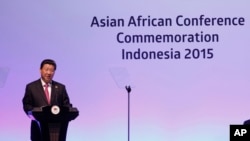Wealthy nations should abandon "political strings" on aid to developing countries, Chinese President Xi Jinping said at a conference Wednesday that aims to strengthen ties between Africa and Asia.
More than 30 heads of state are in Jakarta, the capital of Indonesia, for the five-day Asian-African Summit, which commemorates the 1955 conference that laid the foundations for the Cold War-era Non-Aligned Movement (NAM).
Conference goers hope to further expand economic cooperation between Africa and Asia. The two continents contain some of the world's largest emerging markets, or countries that are in the process of becoming more advanced.
Expanding influence
China is Africa's largest trading partner, importing tens of billions of dollars each year in natural resources and investing in crucial development across the continent, including massive infrastructure projects and debt relief programs.
But as it expands its influence in Africa, many in the West have accused China of ignoring human rights concerns - for instance, by offering "no strings attached" aid packages to countries with authoritarian governments.
Xi on Wednesday defended China's foreign aid policy, saying the world's richer countries have a responsibility to fulfill their commitments to developing nations without demanding political concessions.
Such cooperation "should be based on mutual respect and equality," said President Xi, who added that China "will continue to offer assistance to developing countries with no political strings attached."
"We need to follow a win-win approach in common development that is in line with our development strategies, so we can turn the forte of the two continents into economic strength, deepening regional and cross-regional cooperation, as well as encourage freedom of trade and investment," he said.
Asian Infrastructure Investment Bank
Xi also touted the benefits of the new Chinese-led Asian Infrastructure Investment Bank, or AIIB, which many see as a competitor to the United States-backed World Bank, International Monetary Fund, and Asian Development Bank.
"China will work with all parties in the building of the Silk Road Economic Belt and the 21st century Maritime Silk Road. Together we'll launch the Asian Infrastructure Investment Bank and making proper use on the Silk Road Fund. We will continue to support South-South Cooperation," he said.
Fifty-seven countries including U.S. allies such as Britain, Germany and France have joined the AIIB as founding members.
Others, including the U.S. and Japan, have stayed out, citing concerns over environmental and labor standards, as well as fears that China will use the lender to advance its own foreign policy interests. China hopes to get the bank up and running by the end of the year.
High-profile absences
The Indonesian summit is being attended by the leaders of countries including China, Japan, Brunei, Malaysia, Myanmar, and Indonesia. However, the gathering was also marked by the absence of several key figures, including Indian Prime Minister Narendra Modi and South African President Jacob Zuma.
The original 1955 conference, referred to as the Bandung Conference, gathered countries, many of them newly independent, in the city of Bandung on Java island. The goal was to promote cultural and economic cooperation after decades of colonialism and foreign occupation.




